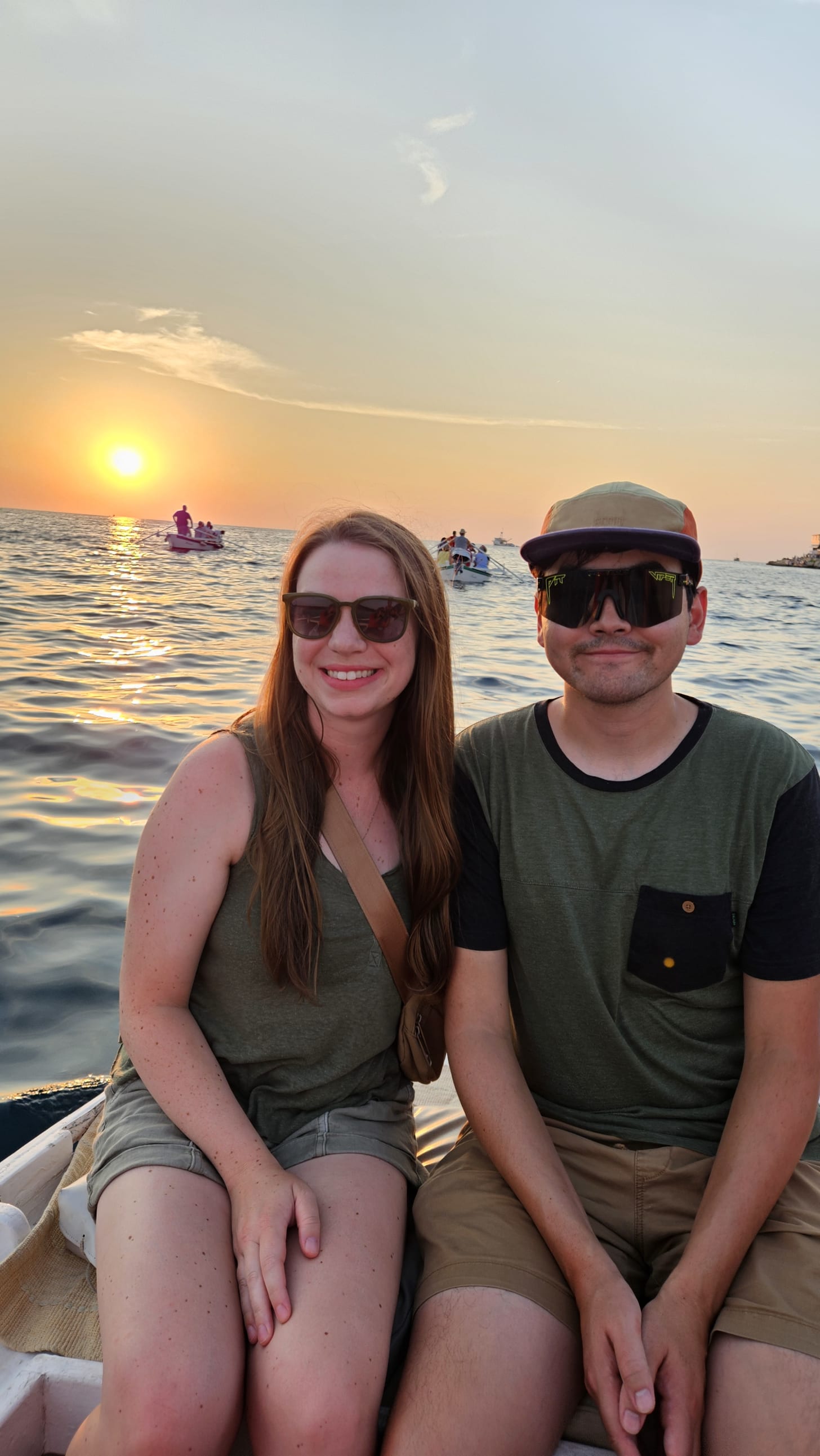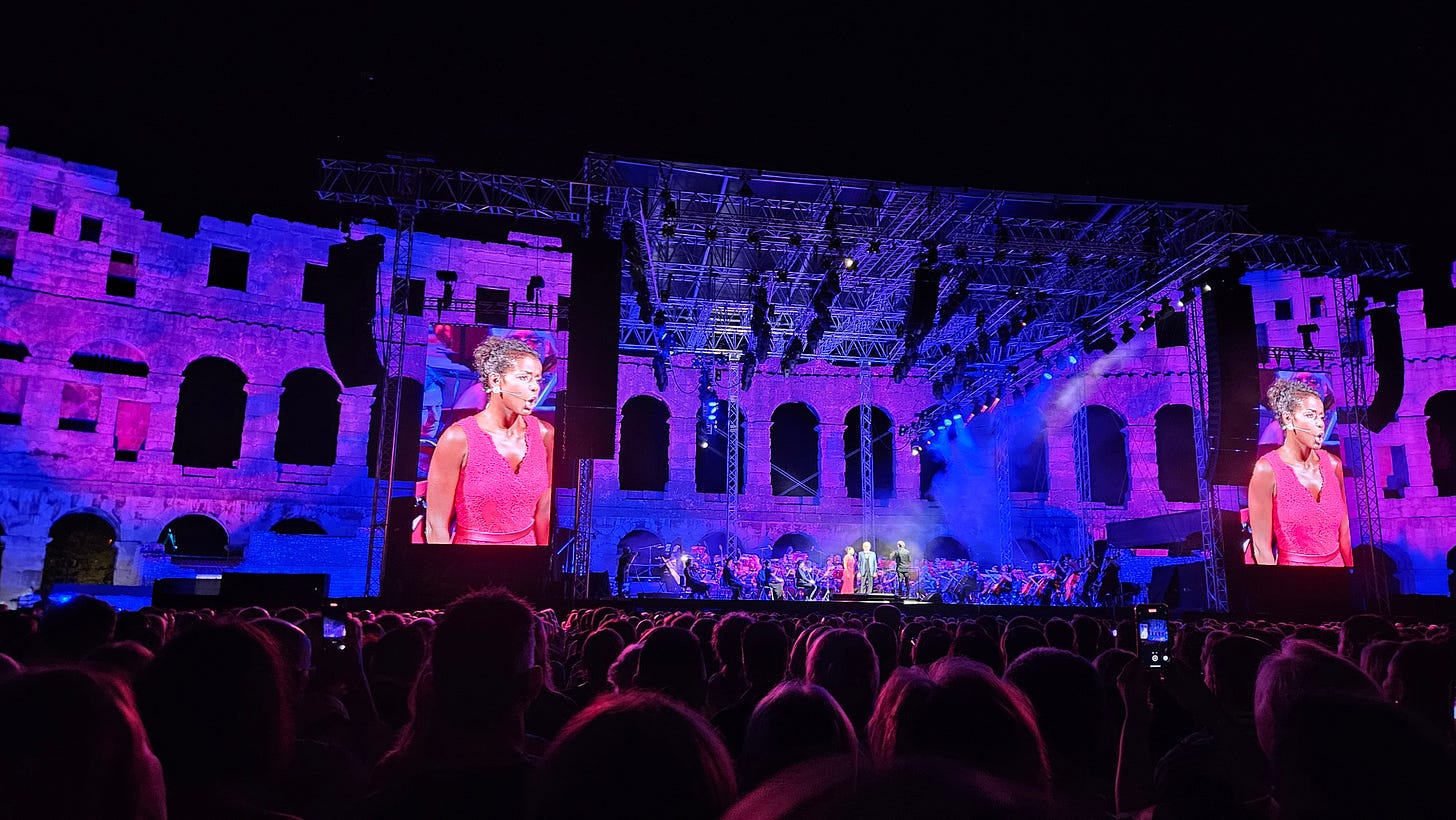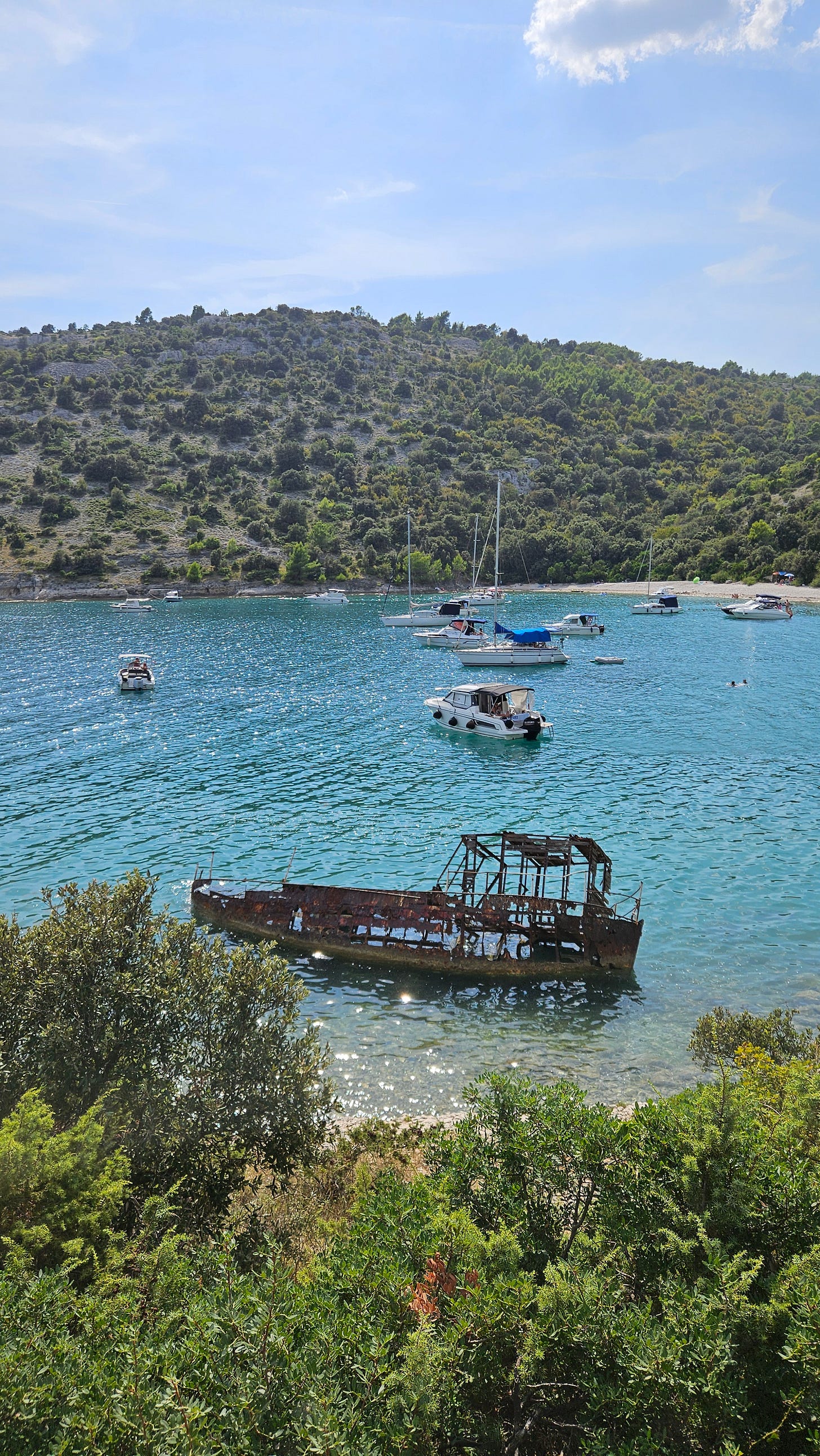“Andiamo!” a woman who is dressed more like she’s going on safari than a boat, calls abruptly and starts winding her way through the tourists that meander down the cobblestone streets. We hustle to keep up and look behind us as half the group gets lost almost immediately. Our hurried trek ends at the pier where six flat-bottomed wooden boats, called batanas, are bobbing on the gentle waves, waiting for us.
It’s unclear if the organizers are speaking Italian or Croatian, or perhaps a pidgin, but we get the gist of it and board the first boat with a young Dutch couple and a pair of retired Germans. The sun is sinking low in the sky, bathing the city in peach colored light as our skipper rows us out into the bay, using skinny wooden oars. The sixth boat is full of silver-haired men, save for one young guy, and a guitar gets unpacked, the chords floating over the water to us. They start to sing.
The Batana tradition here in Rovinj—the boat building, fishing techniques and songs—has been protected by UNESCO since 2016. We’re on an excursion run by a museum to experience this tradition firsthand. Usually, the batanas have colorful sails but today we’re just rowing through the harbor, watching as the sun lights up the church, the colorful buildings and the waves. It’s magical to see one of our favorite spots from the water, serenaded by the fishermen.
The Europeans in our boat find out that we’ve moved here from America and begin peppering us with questions. Topher mildly tells them that it’s nice to be here because America is a mess. The Germans sharply ask, “what do you mean!?” but we’re saved from getting into politics ourselves when the Dutch answer for us.
It’s always interesting to see how the rest of the world views America. Hazelnut made a friend recently, a five month old Malinois (aka, Malligator) puppy that lives down the street and when the two of them were wrestling in our apartment yard, the conversation lasted five minutes before her mom asked who we were voting for.
Eventually, we pull into the dock on the other end of town and walk down the cobbled streets to an alley where a set of stairs goes right down to the water. There’s a trinket store with racks of cheap junk blocking the sea access, but I can see how this would have been accessible by batana at one time. Through a doorway, we take a few steps down into a half buried, traditional wine cellar called a spacio. It’s amazingly cool and we take our seats at long, communal tables in front of the barrels with our companions. The fishermen settle in and serenade us all night as we chat about travel and dialects, electric cars and writing. Nearly the entire dinner is from the sea. We eat anchovies on toast, risotto with squid and mussels, fried calamari alongside whole fried sardines. The whole fish are a little much, but we make a valiant effort to match our table mates. The local table wine, young malvasia so yellow it looks like cooking oil, flows freely. We rap the table in time as the fishermen sing “Ciao Bella”. The kitchen is open to the water and through the propped door we get a breeze scented of sea and fritule, the little Croatian donuts dusted with powdered sugar that are often served at Christmas. By the time we leave it's almost midnight and we’re floating.
I’ve never bought more expensive concert tickets, but when we find our seats on the floor of Pula’s ancient Roman colleseum to see Andrea Bocelli under the stars, I decide it’s worth it before hearing even a single note. We debate what the Croatian on our seats means before deciding we’re in the wrong row. We move, twice more, and once we’re confident we're in our purchased seats, they’re even better than when we first started. A full orchestra accompanies the tenor and though he’s 65 years old—and blind we learn—his voice fills the colleseum, saturating us in powerful song. He brings out an Ethiopian opera singer, Pavarotti’s flutist, a Slovenian pop star and a pair of muscular dancers throughout the night. The lights illuminate the ancient stone walls and the Big Dipper shifts above his head. I can’t help tearing up when “I Can’t Help Falling in Love With You” reverberates around the amphitheatre.
The next morning we drive through the center of the peninsula, on little country roads passing under thick tunnels of trees and by rows of vines, the grapes settling into deeper and deeper shades of plum and dusty yellow as the season progresses. When we get out, farther northeast than we usually go, it’s oppressively hot and the cliffs are scrubby and dry. We hike a dusty trail, the sea below us sparkling turquoise and taunting our sweating bodies. Finally, we come around a bend and see the bay with the beach we’re aiming for in it’s crook. Hazelnut and I run for the water immeadiately, splashing into the surprisingly chilly water. The beach is relatively empty, the 15-minute hike having deterred most, except those who arrived by boat. Their vessels are anchored in the bay and little kids jump off, water wings catching their fall. We swim around them, examining a rusty shipwreck and dodging clumps of seagrass. Every time a snorkeler passes, I have to grab a hold of Hazelnut’s life vest to keep her from tackling them. They fascinate her, for reasons unbenownst to me. Back on shore, Topher is examing the hermit crabs scuttling about and Hazelnut picks one up in her teeth. We have to yell at her to drop it and she retaliates by zooming up and down the beach, rolling in the rotting seagrass on shore. There’s a beach bar running on a generator and we grab drinks and sit in macrame swings overlooking the bobbing boats. A group comes in on seadoos and orders glasses of red wine, bringing them back into the sea with them.
When we’re dressed and ready to leave I try to convince Hazelnut to take one more dip to stay cool on the walk back. She doesn’t want to go all the way in without us, and an older man jogs over, seeing our attempts and thinking we're trying to teach her to swim. He tells us he can get her to go in. We watch as he dives in and coaxes her into the deeper water and she swims out with this stranger, no problem. “Brava! Brava!” He yells, clapping. Laughing, we walk the dripping dog back up the hill to the car.
The dog is mildewing. I didn’t know this was possible, but between her thick, thick coat and the frequent ocean-swim-to-bath cycle, she spends so much of her time damp that it makes sense, I suppose. Even her constant presence under the air conditioner can’t dry her fast enough. Topher and I come down sick and we make quite the trio as we rub special shampoo into her coat for the third time this week.
-Mikaela








